NRS 1806: Exploring Effective Communication in Nursing Practice
VerifiedAdded on 2022/09/11
|7
|1695
|19
Essay
AI Summary
This essay, prepared for NRS 1806, delves into the critical role of communication in nursing, emphasizing its significance for Registered Nurses (RNs) in healthcare settings. It explores the importance of effective communication in establishing patient trust, reducing anxiety, and fostering positive patient outcomes. The essay identifies and analyzes two key verbal communication strategies employed by RNs: demonstrating respect and empathy, and patient education. Furthermore, it outlines two major barriers to effective non-verbal communication, namely, lack of cultural knowledge and ineffective non-verbal communication skills. The essay references several scholarly sources to support its arguments, underscoring the multifaceted nature of communication in nursing and its impact on patient care and overall healthcare delivery.
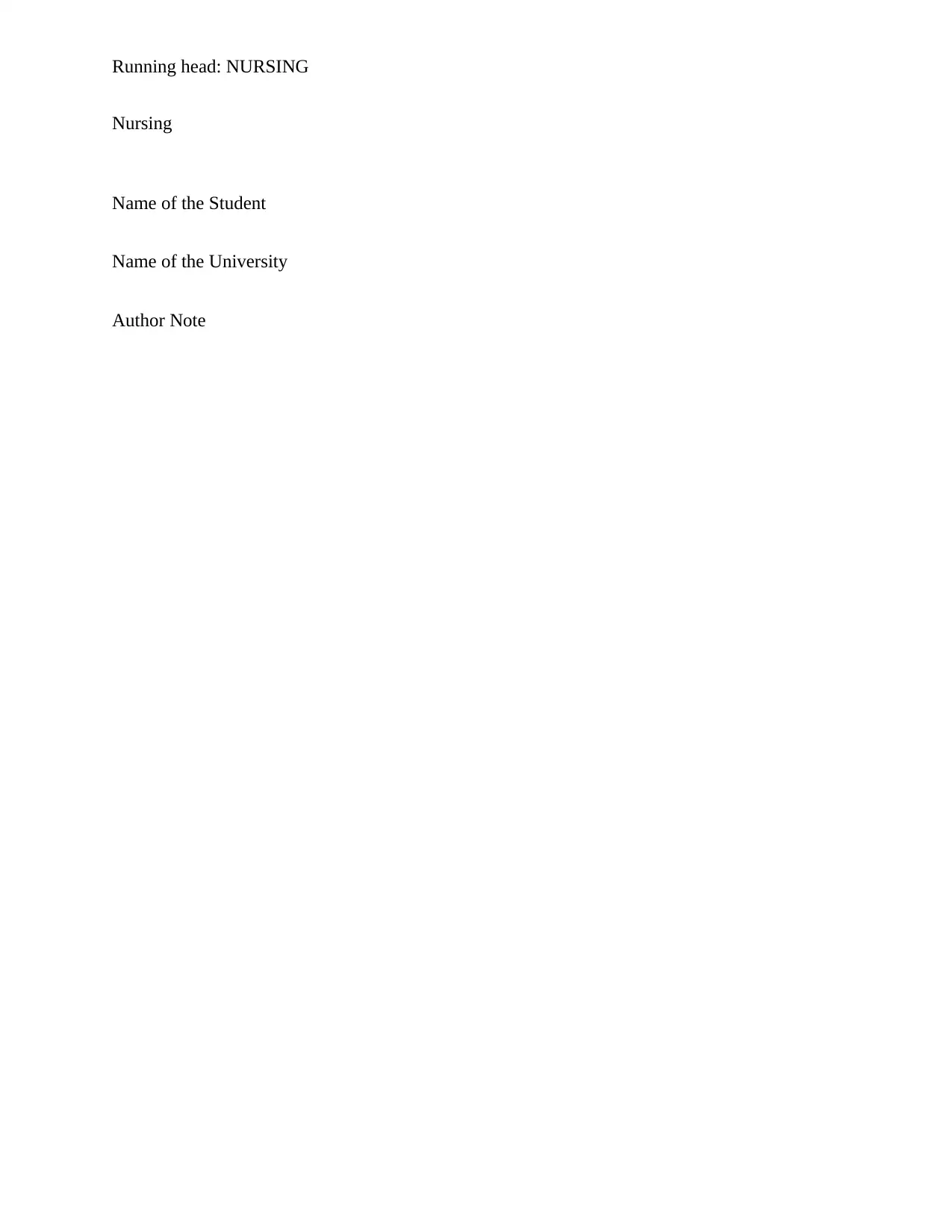
Running head: NURSING
Nursing
Name of the Student
Name of the University
Author Note
Nursing
Name of the Student
Name of the University
Author Note
Paraphrase This Document
Need a fresh take? Get an instant paraphrase of this document with our AI Paraphraser
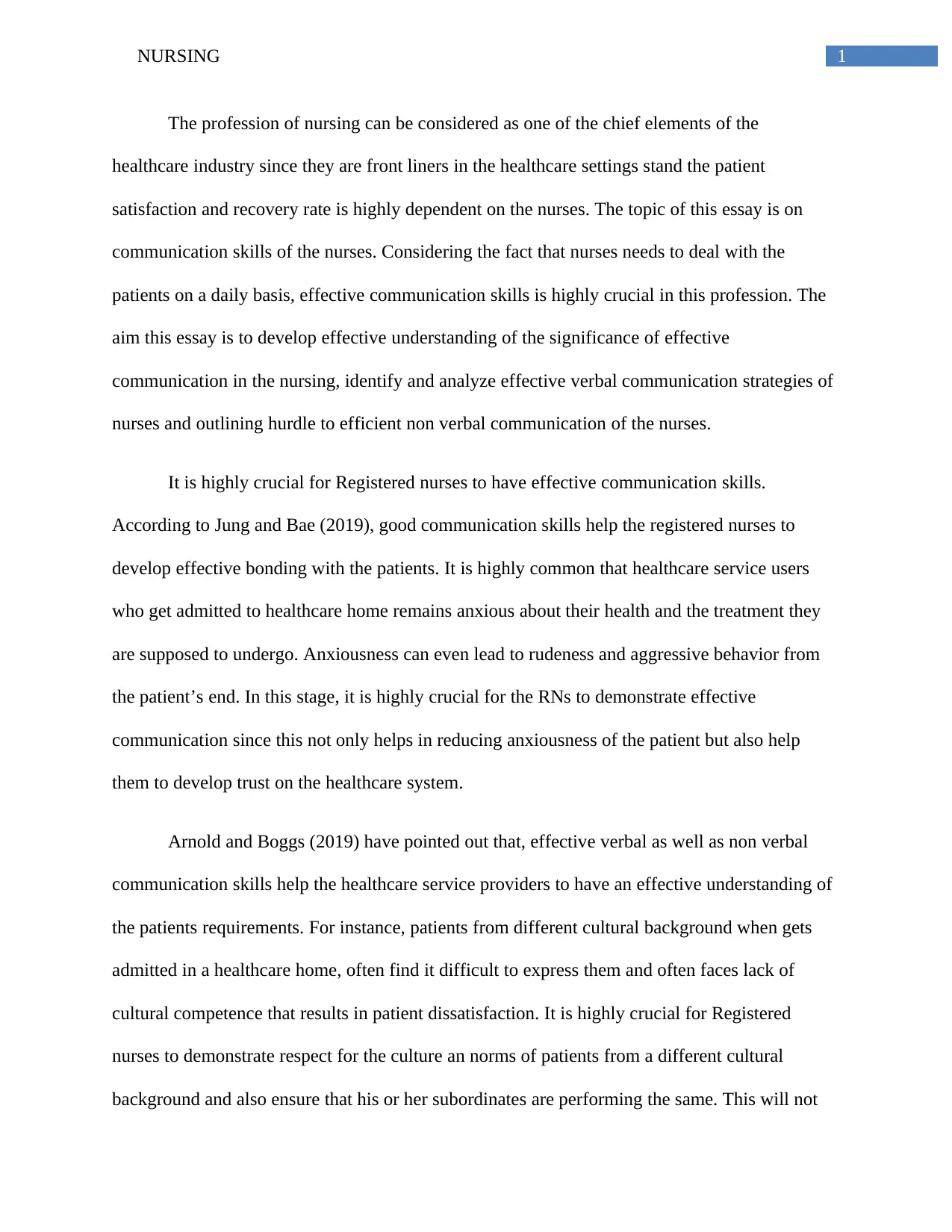
1NURSING
The profession of nursing can be considered as one of the chief elements of the
healthcare industry since they are front liners in the healthcare settings stand the patient
satisfaction and recovery rate is highly dependent on the nurses. The topic of this essay is on
communication skills of the nurses. Considering the fact that nurses needs to deal with the
patients on a daily basis, effective communication skills is highly crucial in this profession. The
aim this essay is to develop effective understanding of the significance of effective
communication in the nursing, identify and analyze effective verbal communication strategies of
nurses and outlining hurdle to efficient non verbal communication of the nurses.
It is highly crucial for Registered nurses to have effective communication skills.
According to Jung and Bae (2019), good communication skills help the registered nurses to
develop effective bonding with the patients. It is highly common that healthcare service users
who get admitted to healthcare home remains anxious about their health and the treatment they
are supposed to undergo. Anxiousness can even lead to rudeness and aggressive behavior from
the patient’s end. In this stage, it is highly crucial for the RNs to demonstrate effective
communication since this not only helps in reducing anxiousness of the patient but also help
them to develop trust on the healthcare system.
Arnold and Boggs (2019) have pointed out that, effective verbal as well as non verbal
communication skills help the healthcare service providers to have an effective understanding of
the patients requirements. For instance, patients from different cultural background when gets
admitted in a healthcare home, often find it difficult to express them and often faces lack of
cultural competence that results in patient dissatisfaction. It is highly crucial for Registered
nurses to demonstrate respect for the culture an norms of patients from a different cultural
background and also ensure that his or her subordinates are performing the same. This will not
The profession of nursing can be considered as one of the chief elements of the
healthcare industry since they are front liners in the healthcare settings stand the patient
satisfaction and recovery rate is highly dependent on the nurses. The topic of this essay is on
communication skills of the nurses. Considering the fact that nurses needs to deal with the
patients on a daily basis, effective communication skills is highly crucial in this profession. The
aim this essay is to develop effective understanding of the significance of effective
communication in the nursing, identify and analyze effective verbal communication strategies of
nurses and outlining hurdle to efficient non verbal communication of the nurses.
It is highly crucial for Registered nurses to have effective communication skills.
According to Jung and Bae (2019), good communication skills help the registered nurses to
develop effective bonding with the patients. It is highly common that healthcare service users
who get admitted to healthcare home remains anxious about their health and the treatment they
are supposed to undergo. Anxiousness can even lead to rudeness and aggressive behavior from
the patient’s end. In this stage, it is highly crucial for the RNs to demonstrate effective
communication since this not only helps in reducing anxiousness of the patient but also help
them to develop trust on the healthcare system.
Arnold and Boggs (2019) have pointed out that, effective verbal as well as non verbal
communication skills help the healthcare service providers to have an effective understanding of
the patients requirements. For instance, patients from different cultural background when gets
admitted in a healthcare home, often find it difficult to express them and often faces lack of
cultural competence that results in patient dissatisfaction. It is highly crucial for Registered
nurses to demonstrate respect for the culture an norms of patients from a different cultural
background and also ensure that his or her subordinates are performing the same. This will not
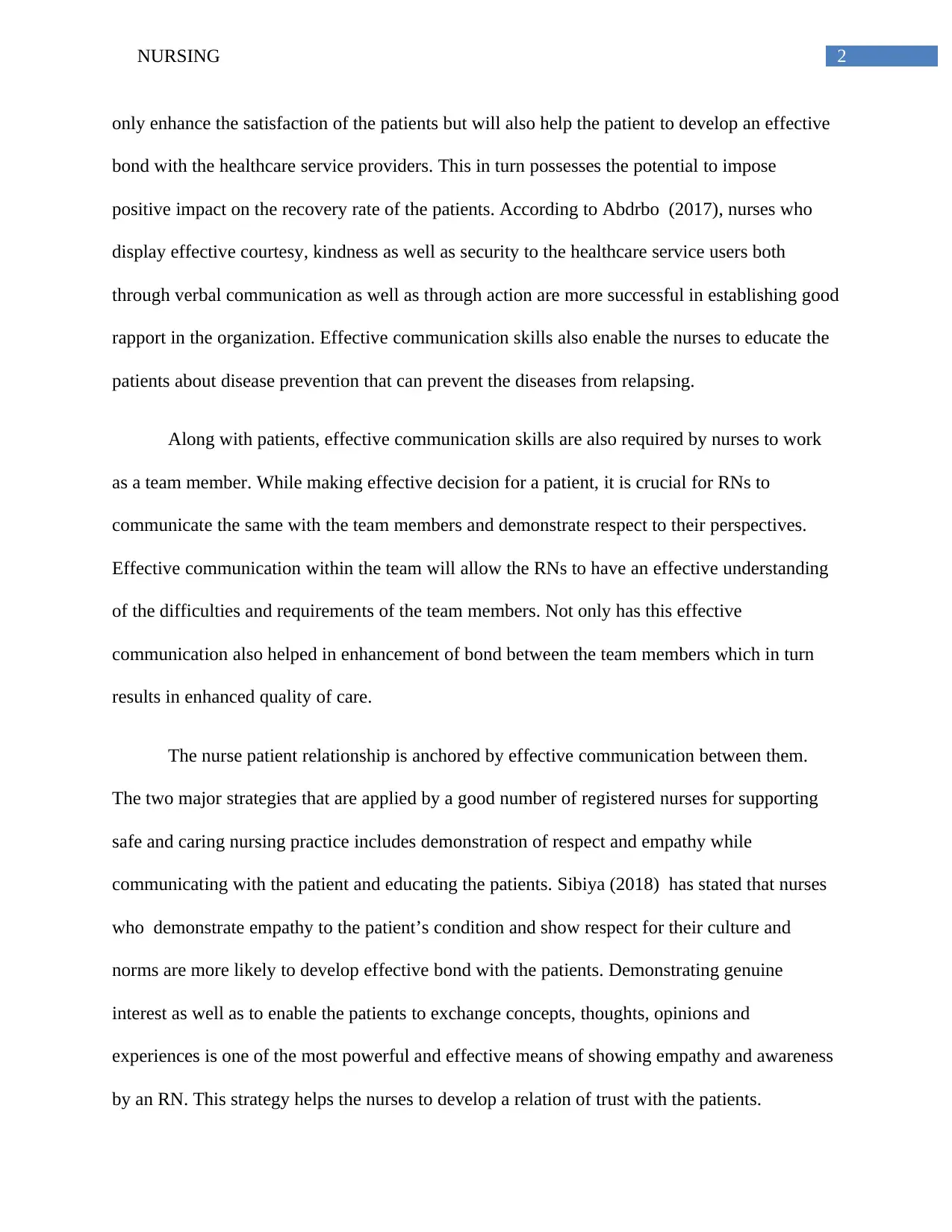
2NURSING
only enhance the satisfaction of the patients but will also help the patient to develop an effective
bond with the healthcare service providers. This in turn possesses the potential to impose
positive impact on the recovery rate of the patients. According to Abdrbo (2017), nurses who
display effective courtesy, kindness as well as security to the healthcare service users both
through verbal communication as well as through action are more successful in establishing good
rapport in the organization. Effective communication skills also enable the nurses to educate the
patients about disease prevention that can prevent the diseases from relapsing.
Along with patients, effective communication skills are also required by nurses to work
as a team member. While making effective decision for a patient, it is crucial for RNs to
communicate the same with the team members and demonstrate respect to their perspectives.
Effective communication within the team will allow the RNs to have an effective understanding
of the difficulties and requirements of the team members. Not only has this effective
communication also helped in enhancement of bond between the team members which in turn
results in enhanced quality of care.
The nurse patient relationship is anchored by effective communication between them.
The two major strategies that are applied by a good number of registered nurses for supporting
safe and caring nursing practice includes demonstration of respect and empathy while
communicating with the patient and educating the patients. Sibiya (2018) has stated that nurses
who demonstrate empathy to the patient’s condition and show respect for their culture and
norms are more likely to develop effective bond with the patients. Demonstrating genuine
interest as well as to enable the patients to exchange concepts, thoughts, opinions and
experiences is one of the most powerful and effective means of showing empathy and awareness
by an RN. This strategy helps the nurses to develop a relation of trust with the patients.
only enhance the satisfaction of the patients but will also help the patient to develop an effective
bond with the healthcare service providers. This in turn possesses the potential to impose
positive impact on the recovery rate of the patients. According to Abdrbo (2017), nurses who
display effective courtesy, kindness as well as security to the healthcare service users both
through verbal communication as well as through action are more successful in establishing good
rapport in the organization. Effective communication skills also enable the nurses to educate the
patients about disease prevention that can prevent the diseases from relapsing.
Along with patients, effective communication skills are also required by nurses to work
as a team member. While making effective decision for a patient, it is crucial for RNs to
communicate the same with the team members and demonstrate respect to their perspectives.
Effective communication within the team will allow the RNs to have an effective understanding
of the difficulties and requirements of the team members. Not only has this effective
communication also helped in enhancement of bond between the team members which in turn
results in enhanced quality of care.
The nurse patient relationship is anchored by effective communication between them.
The two major strategies that are applied by a good number of registered nurses for supporting
safe and caring nursing practice includes demonstration of respect and empathy while
communicating with the patient and educating the patients. Sibiya (2018) has stated that nurses
who demonstrate empathy to the patient’s condition and show respect for their culture and
norms are more likely to develop effective bond with the patients. Demonstrating genuine
interest as well as to enable the patients to exchange concepts, thoughts, opinions and
experiences is one of the most powerful and effective means of showing empathy and awareness
by an RN. This strategy helps the nurses to develop a relation of trust with the patients.
⊘ This is a preview!⊘
Do you want full access?
Subscribe today to unlock all pages.

Trusted by 1+ million students worldwide
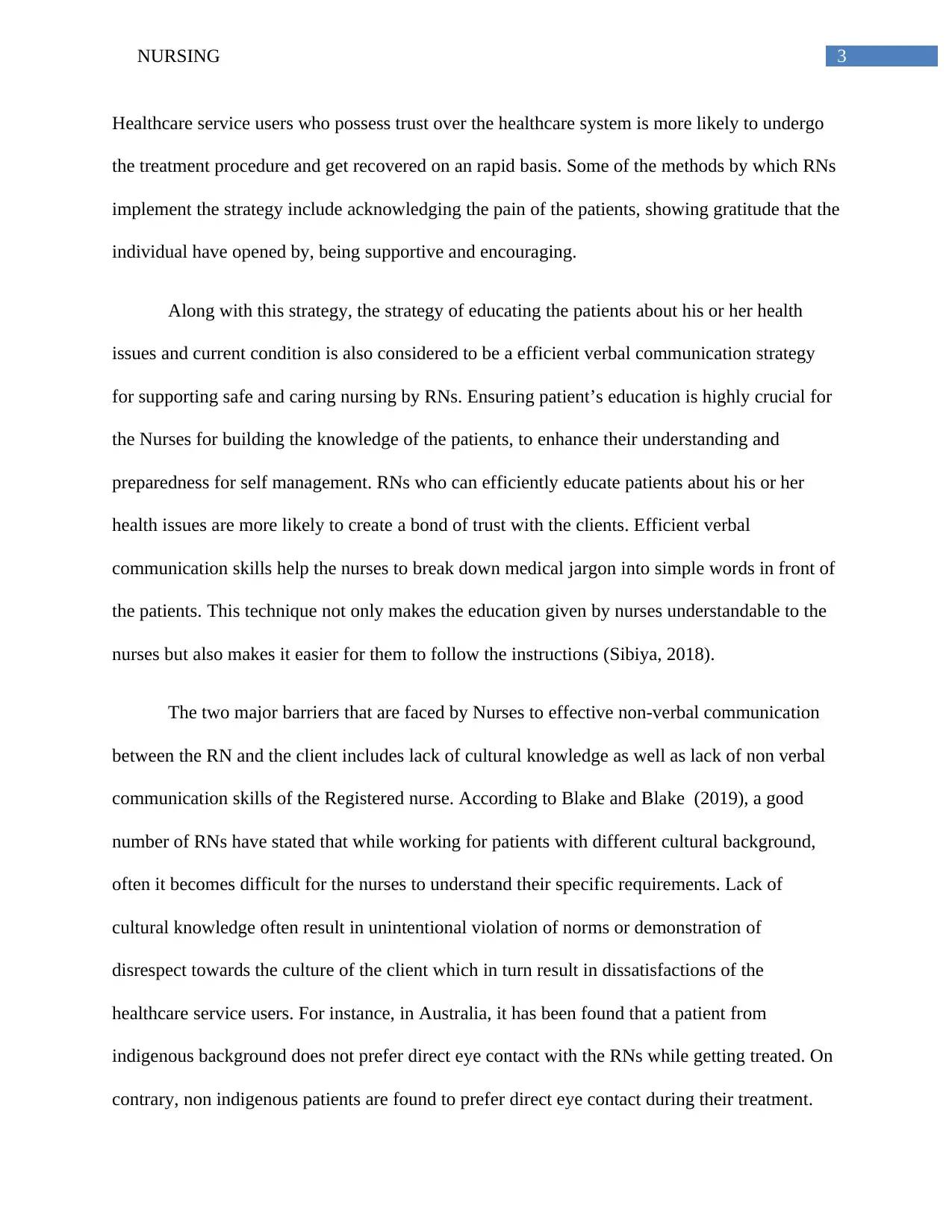
3NURSING
Healthcare service users who possess trust over the healthcare system is more likely to undergo
the treatment procedure and get recovered on an rapid basis. Some of the methods by which RNs
implement the strategy include acknowledging the pain of the patients, showing gratitude that the
individual have opened by, being supportive and encouraging.
Along with this strategy, the strategy of educating the patients about his or her health
issues and current condition is also considered to be a efficient verbal communication strategy
for supporting safe and caring nursing by RNs. Ensuring patient’s education is highly crucial for
the Nurses for building the knowledge of the patients, to enhance their understanding and
preparedness for self management. RNs who can efficiently educate patients about his or her
health issues are more likely to create a bond of trust with the clients. Efficient verbal
communication skills help the nurses to break down medical jargon into simple words in front of
the patients. This technique not only makes the education given by nurses understandable to the
nurses but also makes it easier for them to follow the instructions (Sibiya, 2018).
The two major barriers that are faced by Nurses to effective non-verbal communication
between the RN and the client includes lack of cultural knowledge as well as lack of non verbal
communication skills of the Registered nurse. According to Blake and Blake (2019), a good
number of RNs have stated that while working for patients with different cultural background,
often it becomes difficult for the nurses to understand their specific requirements. Lack of
cultural knowledge often result in unintentional violation of norms or demonstration of
disrespect towards the culture of the client which in turn result in dissatisfactions of the
healthcare service users. For instance, in Australia, it has been found that a patient from
indigenous background does not prefer direct eye contact with the RNs while getting treated. On
contrary, non indigenous patients are found to prefer direct eye contact during their treatment.
Healthcare service users who possess trust over the healthcare system is more likely to undergo
the treatment procedure and get recovered on an rapid basis. Some of the methods by which RNs
implement the strategy include acknowledging the pain of the patients, showing gratitude that the
individual have opened by, being supportive and encouraging.
Along with this strategy, the strategy of educating the patients about his or her health
issues and current condition is also considered to be a efficient verbal communication strategy
for supporting safe and caring nursing by RNs. Ensuring patient’s education is highly crucial for
the Nurses for building the knowledge of the patients, to enhance their understanding and
preparedness for self management. RNs who can efficiently educate patients about his or her
health issues are more likely to create a bond of trust with the clients. Efficient verbal
communication skills help the nurses to break down medical jargon into simple words in front of
the patients. This technique not only makes the education given by nurses understandable to the
nurses but also makes it easier for them to follow the instructions (Sibiya, 2018).
The two major barriers that are faced by Nurses to effective non-verbal communication
between the RN and the client includes lack of cultural knowledge as well as lack of non verbal
communication skills of the Registered nurse. According to Blake and Blake (2019), a good
number of RNs have stated that while working for patients with different cultural background,
often it becomes difficult for the nurses to understand their specific requirements. Lack of
cultural knowledge often result in unintentional violation of norms or demonstration of
disrespect towards the culture of the client which in turn result in dissatisfactions of the
healthcare service users. For instance, in Australia, it has been found that a patient from
indigenous background does not prefer direct eye contact with the RNs while getting treated. On
contrary, non indigenous patients are found to prefer direct eye contact during their treatment.
Paraphrase This Document
Need a fresh take? Get an instant paraphrase of this document with our AI Paraphraser
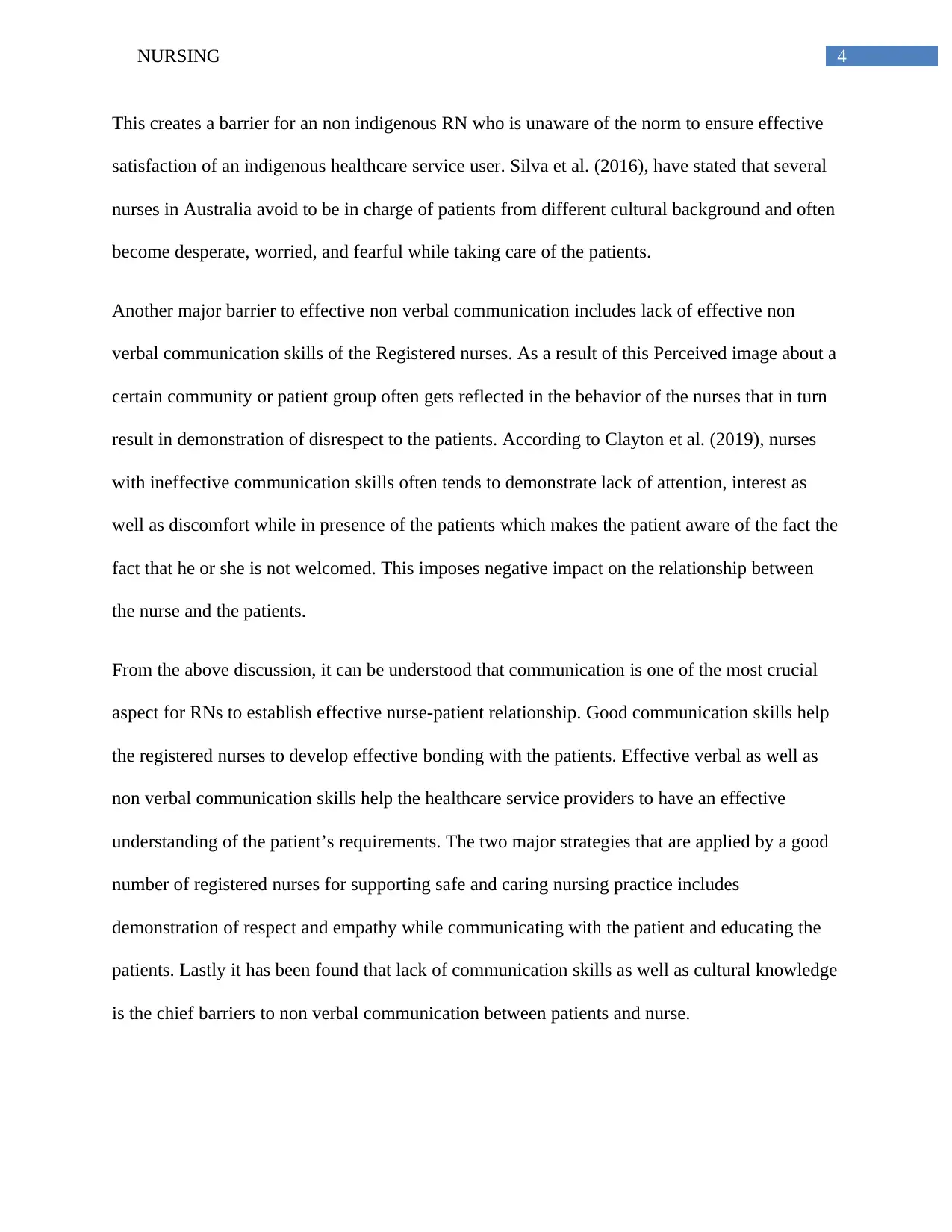
4NURSING
This creates a barrier for an non indigenous RN who is unaware of the norm to ensure effective
satisfaction of an indigenous healthcare service user. Silva et al. (2016), have stated that several
nurses in Australia avoid to be in charge of patients from different cultural background and often
become desperate, worried, and fearful while taking care of the patients.
Another major barrier to effective non verbal communication includes lack of effective non
verbal communication skills of the Registered nurses. As a result of this Perceived image about a
certain community or patient group often gets reflected in the behavior of the nurses that in turn
result in demonstration of disrespect to the patients. According to Clayton et al. (2019), nurses
with ineffective communication skills often tends to demonstrate lack of attention, interest as
well as discomfort while in presence of the patients which makes the patient aware of the fact the
fact that he or she is not welcomed. This imposes negative impact on the relationship between
the nurse and the patients.
From the above discussion, it can be understood that communication is one of the most crucial
aspect for RNs to establish effective nurse-patient relationship. Good communication skills help
the registered nurses to develop effective bonding with the patients. Effective verbal as well as
non verbal communication skills help the healthcare service providers to have an effective
understanding of the patient’s requirements. The two major strategies that are applied by a good
number of registered nurses for supporting safe and caring nursing practice includes
demonstration of respect and empathy while communicating with the patient and educating the
patients. Lastly it has been found that lack of communication skills as well as cultural knowledge
is the chief barriers to non verbal communication between patients and nurse.
This creates a barrier for an non indigenous RN who is unaware of the norm to ensure effective
satisfaction of an indigenous healthcare service user. Silva et al. (2016), have stated that several
nurses in Australia avoid to be in charge of patients from different cultural background and often
become desperate, worried, and fearful while taking care of the patients.
Another major barrier to effective non verbal communication includes lack of effective non
verbal communication skills of the Registered nurses. As a result of this Perceived image about a
certain community or patient group often gets reflected in the behavior of the nurses that in turn
result in demonstration of disrespect to the patients. According to Clayton et al. (2019), nurses
with ineffective communication skills often tends to demonstrate lack of attention, interest as
well as discomfort while in presence of the patients which makes the patient aware of the fact the
fact that he or she is not welcomed. This imposes negative impact on the relationship between
the nurse and the patients.
From the above discussion, it can be understood that communication is one of the most crucial
aspect for RNs to establish effective nurse-patient relationship. Good communication skills help
the registered nurses to develop effective bonding with the patients. Effective verbal as well as
non verbal communication skills help the healthcare service providers to have an effective
understanding of the patient’s requirements. The two major strategies that are applied by a good
number of registered nurses for supporting safe and caring nursing practice includes
demonstration of respect and empathy while communicating with the patient and educating the
patients. Lastly it has been found that lack of communication skills as well as cultural knowledge
is the chief barriers to non verbal communication between patients and nurse.
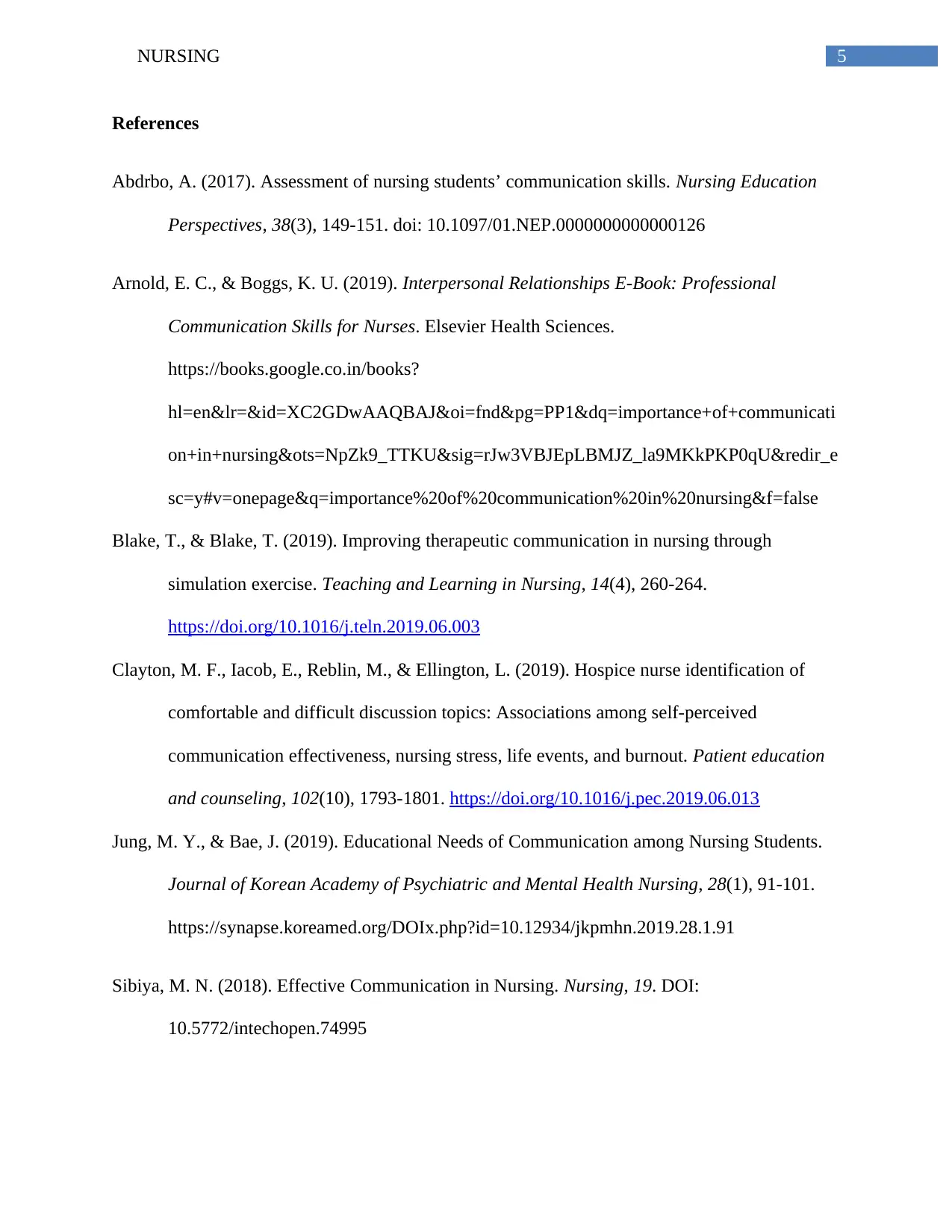
5NURSING
References
Abdrbo, A. (2017). Assessment of nursing students’ communication skills. Nursing Education
Perspectives, 38(3), 149-151. doi: 10.1097/01.NEP.0000000000000126
Arnold, E. C., & Boggs, K. U. (2019). Interpersonal Relationships E-Book: Professional
Communication Skills for Nurses. Elsevier Health Sciences.
https://books.google.co.in/books?
hl=en&lr=&id=XC2GDwAAQBAJ&oi=fnd&pg=PP1&dq=importance+of+communicati
on+in+nursing&ots=NpZk9_TTKU&sig=rJw3VBJEpLBMJZ_la9MKkPKP0qU&redir_e
sc=y#v=onepage&q=importance%20of%20communication%20in%20nursing&f=false
Blake, T., & Blake, T. (2019). Improving therapeutic communication in nursing through
simulation exercise. Teaching and Learning in Nursing, 14(4), 260-264.
https://doi.org/10.1016/j.teln.2019.06.003
Clayton, M. F., Iacob, E., Reblin, M., & Ellington, L. (2019). Hospice nurse identification of
comfortable and difficult discussion topics: Associations among self-perceived
communication effectiveness, nursing stress, life events, and burnout. Patient education
and counseling, 102(10), 1793-1801. https://doi.org/10.1016/j.pec.2019.06.013
Jung, M. Y., & Bae, J. (2019). Educational Needs of Communication among Nursing Students.
Journal of Korean Academy of Psychiatric and Mental Health Nursing, 28(1), 91-101.
https://synapse.koreamed.org/DOIx.php?id=10.12934/jkpmhn.2019.28.1.91
Sibiya, M. N. (2018). Effective Communication in Nursing. Nursing, 19. DOI:
10.5772/intechopen.74995
References
Abdrbo, A. (2017). Assessment of nursing students’ communication skills. Nursing Education
Perspectives, 38(3), 149-151. doi: 10.1097/01.NEP.0000000000000126
Arnold, E. C., & Boggs, K. U. (2019). Interpersonal Relationships E-Book: Professional
Communication Skills for Nurses. Elsevier Health Sciences.
https://books.google.co.in/books?
hl=en&lr=&id=XC2GDwAAQBAJ&oi=fnd&pg=PP1&dq=importance+of+communicati
on+in+nursing&ots=NpZk9_TTKU&sig=rJw3VBJEpLBMJZ_la9MKkPKP0qU&redir_e
sc=y#v=onepage&q=importance%20of%20communication%20in%20nursing&f=false
Blake, T., & Blake, T. (2019). Improving therapeutic communication in nursing through
simulation exercise. Teaching and Learning in Nursing, 14(4), 260-264.
https://doi.org/10.1016/j.teln.2019.06.003
Clayton, M. F., Iacob, E., Reblin, M., & Ellington, L. (2019). Hospice nurse identification of
comfortable and difficult discussion topics: Associations among self-perceived
communication effectiveness, nursing stress, life events, and burnout. Patient education
and counseling, 102(10), 1793-1801. https://doi.org/10.1016/j.pec.2019.06.013
Jung, M. Y., & Bae, J. (2019). Educational Needs of Communication among Nursing Students.
Journal of Korean Academy of Psychiatric and Mental Health Nursing, 28(1), 91-101.
https://synapse.koreamed.org/DOIx.php?id=10.12934/jkpmhn.2019.28.1.91
Sibiya, M. N. (2018). Effective Communication in Nursing. Nursing, 19. DOI:
10.5772/intechopen.74995
⊘ This is a preview!⊘
Do you want full access?
Subscribe today to unlock all pages.

Trusted by 1+ million students worldwide
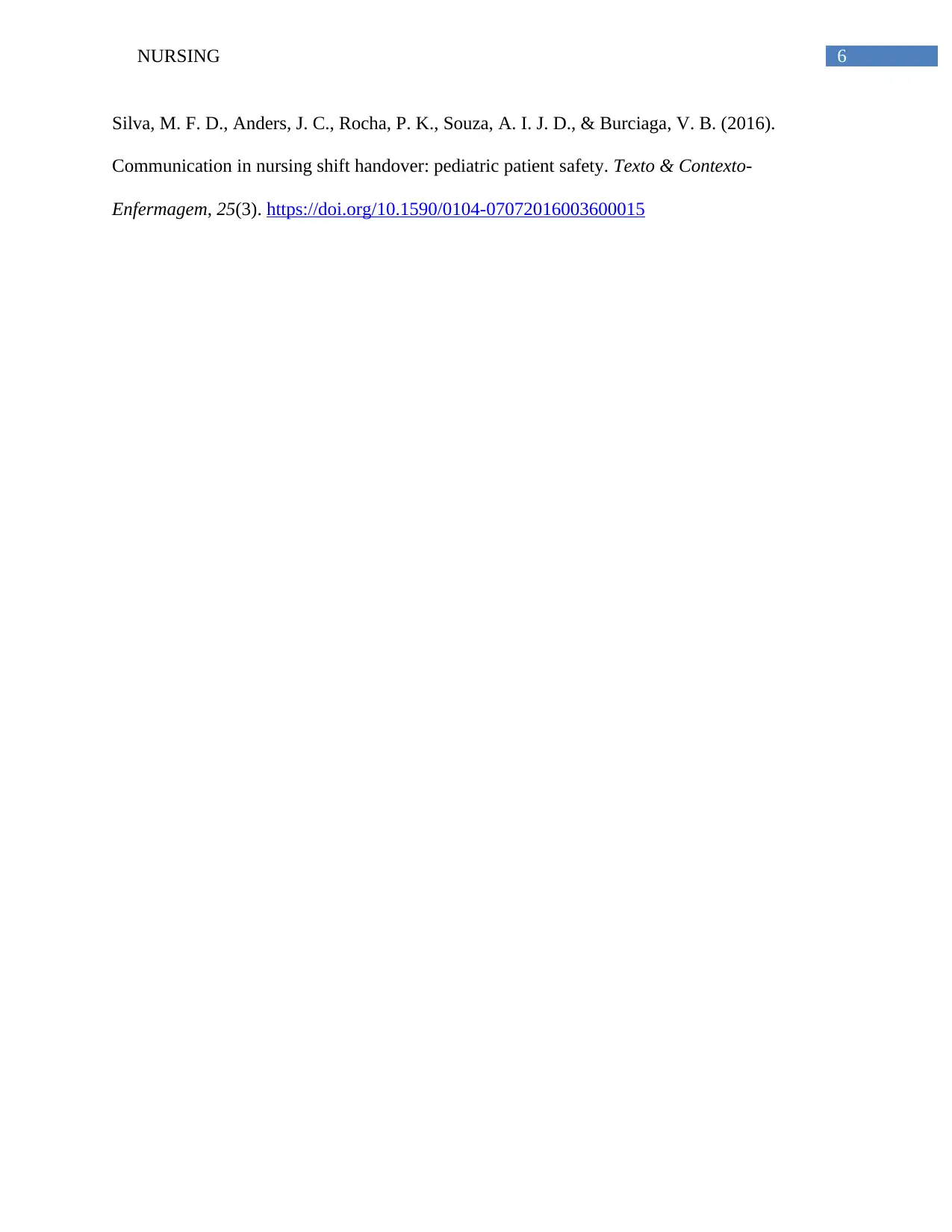
6NURSING
Silva, M. F. D., Anders, J. C., Rocha, P. K., Souza, A. I. J. D., & Burciaga, V. B. (2016).
Communication in nursing shift handover: pediatric patient safety. Texto & Contexto-
Enfermagem, 25(3). https://doi.org/10.1590/0104-07072016003600015
Silva, M. F. D., Anders, J. C., Rocha, P. K., Souza, A. I. J. D., & Burciaga, V. B. (2016).
Communication in nursing shift handover: pediatric patient safety. Texto & Contexto-
Enfermagem, 25(3). https://doi.org/10.1590/0104-07072016003600015
1 out of 7
Related Documents
Your All-in-One AI-Powered Toolkit for Academic Success.
+13062052269
info@desklib.com
Available 24*7 on WhatsApp / Email
![[object Object]](/_next/static/media/star-bottom.7253800d.svg)
Unlock your academic potential
Copyright © 2020–2026 A2Z Services. All Rights Reserved. Developed and managed by ZUCOL.





